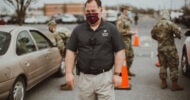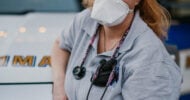Today was my first Match Day as a program director and, while most of my emotions are unprocessed, I already have many thoughts.
I can’t forget the concurrent drop in my stomach, pause in my cardiac systole, and the involuntary intake of breath which occurred when the email arrived—2 minutes early!—from the NRMP. I stacked an extra gasp even before I exhaled the first while I fumbled to open the email. My hands were shaking.
As the email opened, my eyes darted through all of the wrong zones in my progressive lenses and, too nervous to slow down, I yanked them off with my left hand and leaned towards the screen. A major discharge from my vagus nerve created hypotension which brought my eyebrows to rest on the plastic monitor, which I almost toppled over with my large head.
I was prepared for disappointment. I had steeled myself that we might, as a brand-new program, go all the way to the end of our rank list of 56 candidates. Or, match no one—the ultimate rejection. As I gained control over my breath and vision, I saw their names. And instantly I saw their faces. Granular details from their applications and personal statements came into sharp relief, documents that I—no exaggeration—spent six whole weekends in September–October 2024 reading. I recalled their interviews and, in the case of four of them, their campus visits. I tasted remnants of all the tea I drank during recruitment season as the autumn leaves fell outside the windows of my living room. I saw my sweet dog Trixie asleep on the rug at my feet as I typed on my laptop. I continued exhaling, my blood pressure rose, and I lifted my forehead off the computer.
An earthquake survivor from Nepal. A mother with a brand-new baby. A West Virginia native who went to medical school in the Caribbean and longed to return home. A former nurse with so much wisdom and experience it seemed impossible I would ever regard her as an “intern.” An Ethiopian with big, soft brown eyes and a charm which made me refer to him as a “teddy bear” after I met him. A brilliant Pakistani who defied expectations of women, graduated from medical school, and then bravely immigrated to the United States.
Put together, these four women and two men are the inaugural class of internal medicine residents at the Berkeley Medical Center in Martinsburg, WV. Viewed together, five of them have immigrant stories, the kind that were so vilified in the morning’s headlines. Each of them had already endured, survived, achieved, and believed far more than I had by the time I was twenty-six years old and “M.D.” was sewn on my brilliantly white lab coat. They had already earned my respect and the words “mine” and “our” rose in my consciousness when I began to think of them as a group.
Starting a residency has been work, some of it thrilling like skydiving and other parts resembling watching paint dry. At times, I wondered if we would get accredited and, if so, would we—could we?—be successful. I had recently experienced nocturnal panic attacks inspired by creating curriculum and coordinating rotations. One night, I was so queasy at 1:30 a.m. that I actually got out of bed, let the dog out, and then stood in the kitchen and ate four—yes, four—bowls of cereal. As I did so, I realized that I had forgotten to eat dinner even though it was St. Patrick’s Day.
Despite the periods of panic, this journey has taught me that my core team is capable, smart, and cunning, along with being funny and delightful. I had—mostly—gotten used to unresolved problems which, because of my faith in my teammates, I knew would be worked out over time. I also came to believe after the third day of interviews that it was possible—? likely—that talented young doctors might take a leap of faith and come and join us. I could not have known, or, more properly, let myself dream of how good they could be.
And by “good” I am not talking about whether these young doctors can readily dose vancomycin. Or, use glomerular filtration rate to make informed decisions about avoiding harm to their patients’ kidneys. I’m talking about a goodness which, though hard to articulate, is very easy for me to feel. And I had, in fact, felt it with their authentic smiles and their kind eyes. In those moments, I connected with their quiet humility, a kind that comes from being a doctor, traversing the world, only to take a job that is not being a doctor. It had vibrated inside me.
This afternoon, when I finally sat down and caught my breath, I found myself sitting on an airplane bound for Nashville. It was in this quiet moment that I finally let this whole experience wash over me. My residency, and I feel this viscerally in my bones, is the culmination of the American medical education system, an honor and a privilege for me to direct. My first six residents already inspire me to remain committed to this profession’s highest calling and virtues. They remind me to practice abundance, the kind that begs me to spill my secrets, skills, tips, and tricks, the kinds that only an internist knows, the kind that only an internist can learn. This notion that I am a holder of wisdom does not sit easily with me, but I’m learning to coexist by sitting beside it.
I had been swimming recently in a toxic sea of arrogance about whether America was going to be “great” again, was previously great, or existed in a space where something else entirely was true. These six doctors make me have faith that the profession of medicine might—possibly, maybe—achieve something resembling greatness in the future. If we do, it will emerge from our diverse life stories. It will require us to strive for a culture of equitable treatment for everyone in West Virginia. And it will require us to keep an inclusive spirit in our hearts, the kind that welcomes humble and smart humans, some of whom have survived earthquakes and radiate humility from a place deep inside.
Ryan McCarthy is an internal medicine physician.





















![Primary care receives only five cents of every health care dollar [PODCAST]](https://kevinmd.com/wp-content/uploads/Design-4-190x100.jpg)


![Physician father wrestles with daughter’s post-Dobbs future [PODCAST]](https://kevinmd.com/wp-content/uploads/Design-1-1-190x100.jpg)
